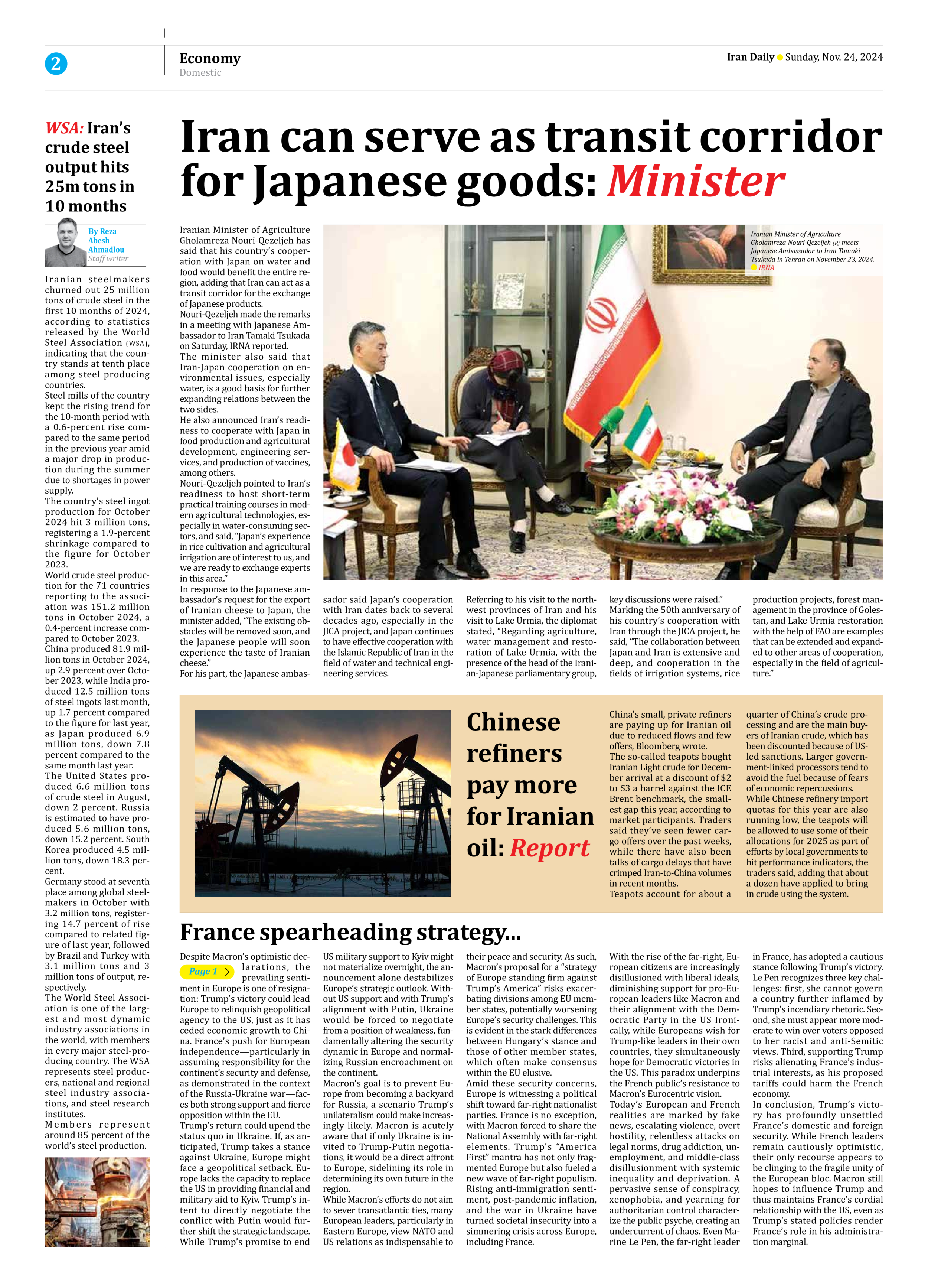
France spearheading strategy...
Page 1
Despite Macron’s optimistic declarations, the prevailing sentiment in Europe is one of resignation: Trump’s victory could lead Europe to relinquish geopolitical agency to the US, just as it has ceded economic growth to China. France’s push for European independence—particularly in assuming responsibility for the continent’s security and defense, as demonstrated in the context of the Russia-Ukraine war—faces both strong support and fierce opposition within the EU.
Trump’s return could upend the status quo in Ukraine. If, as anticipated, Trump takes a stance against Ukraine, Europe might face a geopolitical setback. Europe lacks the capacity to replace the US in providing financial and military aid to Kyiv. Trump’s intent to directly negotiate the conflict with Putin would further shift the strategic landscape. While Trump’s promise to end US military support to Kyiv might not materialize overnight, the announcement alone destabilizes Europe’s strategic outlook. Without US support and with Trump’s alignment with Putin, Ukraine would be forced to negotiate from a position of weakness, fundamentally altering the security dynamic in Europe and normalizing Russian encroachment on the continent.
Macron’s goal is to prevent Europe from becoming a backyard for Russia, a scenario Trump’s unilateralism could make increasingly likely. Macron is acutely aware that if only Ukraine is invited to Trump-Putin negotiations, it would be a direct affront to Europe, sidelining its role in determining its own future in the region.
While Macron’s efforts do not aim to sever transatlantic ties, many European leaders, particularly in Eastern Europe, view NATO and US relations as indispensable to their peace and security. As such, Macron’s proposal for a “strategy of Europe standing firm against Trump’s America” risks exacerbating divisions among EU member states, potentially worsening Europe’s security challenges. This is evident in the stark differences between Hungary’s stance and those of other member states, which often make consensus within the EU elusive.
Amid these security concerns, Europe is witnessing a political shift toward far-right nationalist parties. France is no exception, with Macron forced to share the National Assembly with far-right elements. Trump’s “America First” mantra has not only fragmented Europe but also fueled a new wave of far-right populism. Rising anti-immigration sentiment, post-pandemic inflation, and the war in Ukraine have turned societal insecurity into a simmering crisis across Europe, including France.
With the rise of the far-right, European citizens are increasingly disillusioned with liberal ideals, diminishing support for pro-European leaders like Macron and their alignment with the Democratic Party in the US Ironically, while Europeans wish for Trump-like leaders in their own countries, they simultaneously hope for Democratic victories in the US. This paradox underpins the French public’s resistance to Macron’s Eurocentric vision.
Today’s European and French realities are marked by fake news, escalating violence, overt hostility, relentless attacks on legal norms, drug addiction, unemployment, and middle-class disillusionment with systemic inequality and deprivation. A pervasive sense of conspiracy, xenophobia, and yearning for authoritarian control characterize the public psyche, creating an undercurrent of chaos. Even Marine Le Pen, the far-right leader in France, has adopted a cautious stance following Trump’s victory.
Le Pen recognizes three key challenges: first, she cannot govern a country further inflamed by Trump’s incendiary rhetoric. Second, she must appear more moderate to win over voters opposed to her racist and anti-Semitic views. Third, supporting Trump risks alienating France’s industrial interests, as his proposed tariffs could harm the French economy.
In conclusion, Trump’s victory has profoundly unsettled France’s domestic and foreign security. While French leaders remain cautiously optimistic, their only recourse appears to be clinging to the fragile unity of the European bloc. Macron still hopes to influence Trump and thus maintains France’s cordial relationship with the US, even as Trump’s stated policies render France’s role in his administration marginal.







